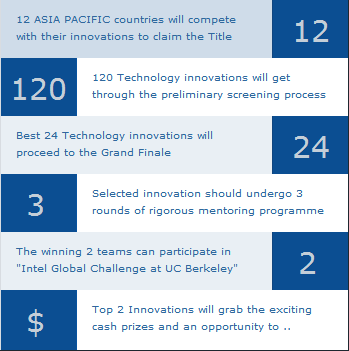I am heading to Asia Entrepreneurial Summit in Bangalore. This is a joint effort by Intel and Department of Science and Technology. Here is what happens.
Two winners (Two members per team) will be sponsored to participate in Intel University of California, Berkeley. You can find more details at this website. A concept note explains the motivation, the process and provides more details. We need more competitions like this. It is great that APIN is involved in this effort, as well.
This got me thinking about the types of incubators we need to support a good product ecosystem.
An Idea Incubator
Inputs are ideas from many people, who are interested in taking them to the next step. Some of these can be technology ideas but others can be ideas for new business models, social innovations etc.
The actors for this incubator are people with ideas, mentors who can guide them in validating the ideas and designers who can help build the prototypes. The innovator initially plays the role of getting potential users involved in validating the idea.
The process is to validate various assumptions associated with these ideas and filter them. The output is a set of high fidelity prototype for each idea, probably iterated several times with real potential users.
The output of these incubators can be consumed by Product/Business incubators. But they can also be consumed by New product groups in various industries. So it helps to involve industries in this effort.
A Product Incubator
The output of Idea Incubator feeds the Product Incubator. The goal of product incubator is to help the innovator produce a minimum viable product usable. A minimum viable product is a set of hypotheses. At each iteration of the product one or more of these hypotheses are validated.
The actors at this stage tend to be product people and developers. They work on some kind of Agile methodology tailored specifically for building products and their goal is to produce several iterations, each more useful and usable and verify all the assumptions including the value provided to the customer.
If the innovator wants to starts a business, he/she can get funding or take the help of a Business Incubator. But there are other places they can go to license their IP, work with new product groups in companies.
A Business Incubator
Once you have a validated product (with an initial set of customers), you can start verifying the business assumptions like value perception, market size, ability to build and grow a sustainable business etc.
One Incubator or Several?
I prefer a distributed model of incubation. The skills and resources needed at each stage are different. We can lump all these three into one incubator but we are more likely to find success in doing them as multiple stages in different places. For example, idea incubators can exist in educational institutions, startup hubs. These may be funded by Government (DST does this for educational institutions now) or by angel networks. A new model of crowd funding is emerging for smaller projects as well. Many ideas may die at this stage so the investors in this stage should be highly risk tolerant. On the positive side, the investment at this stage is pretty low.
I am not sure whether we have product incubators in India. That is certainly a gap we need to fill.
Current incubators in India provide some value at the business level, but not enough. One of the missing facilities is helping the startups in finding product-market fit and early customer development. Product entrepreneurs tend to be technologists with almost non-existent marketing/business development skills. One thought is that the business incubators can be mentored by people from product industries. I am not sure how much of that takes place.
A final thought is that we need product innovation at several levels and for products of several (market) sizes. The next generation incubators have a big challenge.

3 thoughts on “Incubators – The Next Generation?”
Yes, Dorai, Well articulated in detail. India has a huge gap of ecosystem partners or dots, which need to be plugged by way diverse incubators….IGNITA, a recentlt started dedicated to India’s quest for product innovation and community looks forward to learn from your log.
Thanks Raja.
Comments are closed.